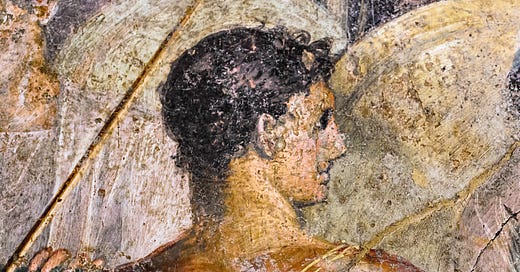Aristeia was the Greek word for a great display of military prowess, especially in single combat. Book XVI of the Iliad contains the aristeia of Patroklos.
To Taunt
We’ve seen a lot of single combat in the Iliad, and it is very common for the warriors of both sides to taunt each other and to boast. This book is no different. Aineias was trying to kill Meriones, but Meriones saw it in time and moved out of the way.
Aineias raged and sneered:
"Meriones
fast dodger that you are, if I had hit you
my spearhead would have stopped your dance for good!"
Meriones, good spearman, answered him:
"For all your power, Aineias, you could hardly
quench the fighting spirit of every man
defending himself against you. You are made
of mortal stuff like me. I, too, can say,
if I could hit you square, then tough and sure
as you may be, you would concede the game
and give your soul to the lord of nightmare, Death."
translated by Robert FitzgeraldOr Not to Taunt
This looks perfectly normal to me. But the response of Patroklos doesn’t. Has anyone else rebuked someone on his own side for talking like this so far in the Iliad?
Patroklos said to him sharply:
"Meriones,
you have your skill, why make a speech about it?
No, old friend, rough words will make no Trojans
back away from the body. Many a one
will be embraced by earth before they do.
War is the use of arms, words are for council.
More talk's pointless now; we need more fighting!"
translated by Robert FitzgeraldPatroklos Jeers
Later, roused by the fury of Zeus, having killed so many men that only their names are listed, Patroklos faces Hektor. He kills the driver of Hektor’s war car, Kebriones, bastard son of Priam, who falls from the car like a diver.
The jeer Patroklos makes then, which otherwise would have seemed normal to me, now stands out.
You jeered at him then, master of horse, Patroklos: "God, what a nimble fellow, somersaulting! If he were out at sea in the fishing grounds this man could feed a crew, diving for oysters going overboard even in rough water, The way he took that earth-dive from his car. The Trojans have their acrobats, I see." translated by Robert Fitzgerald
Hektor’s Boast
The battle rages fiercely over the body of Kebriones, until the Akhaians manage to drag it away from the Trojans.
Three times Patroklos throws himself on the Trojans, killing nine men each time, who are not even named. But the fourth time, Apollo strikes him from behind with an open hand, dazing him, and knocking the helmet of Achilleus, which he is wearing, to the ground and over to Hector. Then the god shatters his spear, knocks down his shield and breaks off his cuirass.
Disarmed and stripped of his shield and armor, Patroklos is now speared from behind by Euphorbos, son of Panthoos, who had already brought down twenty chariot fighters. Patroklos, wounded, tries to retreat.
But Hektor doesn’t let him. He charges through the ranks and spears him in the belly.
On the crest of a mountain, there is a small spring, bubbling up. A lion and a boar, both thirsty, fight over it. The lion, by sheer strength, conquers the boar, barely able to catch his breath. Hektor is the lion. Patroklos is the boar. And so Troy, the beautiful city, is the spring that they were fighting over.
As Patroklos lies dying, Hektor boasts:
"Easy to guess, Patroklos, how you swore to ravage Troy, to take the sweet daylight of liberty from our women, and to drag them off in ships to your own land -- you fool! Between you and those women there is Hector's war-team, thundering out to fight! My spear has pride of place among the Trojan warriors, keeping their evil hour at bay. The kites will feed on you, here on this field. translated by Robert Fitzgerald
So says Hektor. He fights for the women of Troy, to keep them from the day of bondage, from their evil hour. He tells Patroklos that he will be food for birds. But it is his own Andromache who will lose her freedom and his own body that will be left exposed.
Patroklos Prophesies
And yet, as great a warrior as Hektor is, Patroklos reminds him that in the end, all he managed to do was deliver the death blow to a man already unarmed and unarmored by a god, and wounded by another warrior.
"No long life is ahead for you. This day your death stands near, and your immutable end, at Prince Achilleus' hands." translated by Robert Fitzgerald
He hears, but is undaunted.
“Maybe,” he speaks over the dead body of Patroklos, “it will be I instead who kills Achilleus.”
And he rejoins the battle.





Dang. It's been too long since I read this. I think the version I read was edited, too. Because I can't remember the boasts. 🤦♂️
I can see how the Greeks would blame the gods for those seemingly random occurrences in war, though. Blame the gods for Achilles's armor's failure, for not maintaining his weapons, etc. Weapons fail. "Two is one, and one is none" they say in the military because everything fails, and you better have a backup.
But, dang. I really need to read the Loeb Library edition of the Iliad, which has Greek on one side and English on the other. 🤦♂️
Aristeia: one of my favorite concepts. I believe an entire philosophy can be built on this idea alone. Great piece!